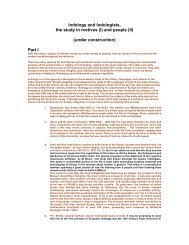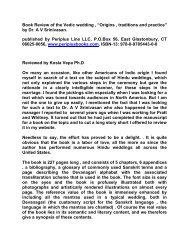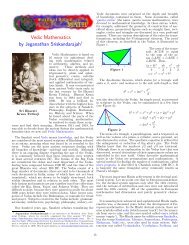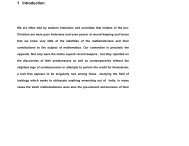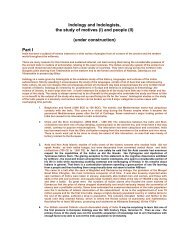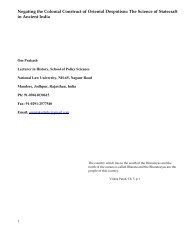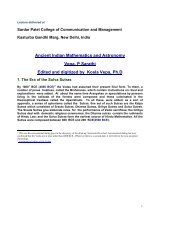The Dhaarmik Traditions - Indic Studies Foundation
The Dhaarmik Traditions - Indic Studies Foundation
The Dhaarmik Traditions - Indic Studies Foundation
Create successful ePaper yourself
Turn your PDF publications into a flip-book with our unique Google optimized e-Paper software.
introduction in this census report, not seen in the previous census reports, was<br />
the study of the "anthropometric" readings of racial characteristics which is<br />
introduced into its discussion of "Caste, Tribe, and Race" in chapter eleven of<br />
the work. <strong>The</strong>re is also a very extensive discussion of the origins of caste in the<br />
census report which has provoked much controversy 7 .<br />
Sir Herbert Risley also wrote a major work on Indian Castes called <strong>The</strong> People<br />
of India which he published in 1908.<br />
No indigenous equivalent to the word Caste in India. <strong>The</strong><br />
English word Caste was derived from Portuguese word<br />
Casta which meant race, breed or lineage. Quite distinct<br />
from Varna<br />
<strong>The</strong> Brits institutionalized the word Caste, using the<br />
decennial Census of India as a tool for ethnographic<br />
mapping and conjured up 100’s of new castes<br />
the Census acted as a catalyst for an increased<br />
consciousness of caste as caste status became an<br />
increasingly significant factor in attaining material status.<br />
See for instance Nicholas Dirks ‘Castes of Mind’<br />
7 “In any case, the British administrators were, understandably overwhelmed by these figures and felt obliged to find a way<br />
to compartmentalize chunks of population into manageable groups. <strong>The</strong> most obvious way to do so was through the use of<br />
India's unique caste system “Ethnographic Mapping and the Construction of the British Census in India Kevin<br />
Hobson<br />
This is a relatively charitable explanation. <strong>The</strong> more plausible one is that they needed an idea of the diversity of India in<br />
order to exploit it for the prolongation of their rule by use of an important dictum that went back to Roman times and to<br />
Julius Caesar, namely Divide et Impera (divide and rule).<br />
177



